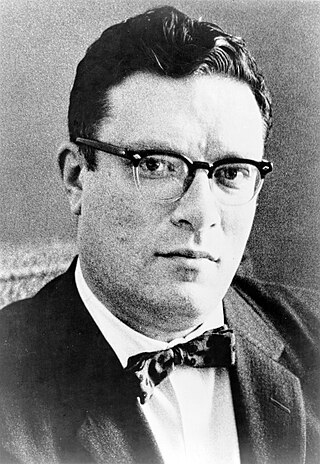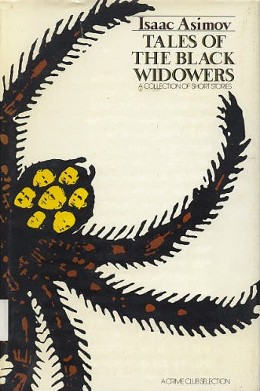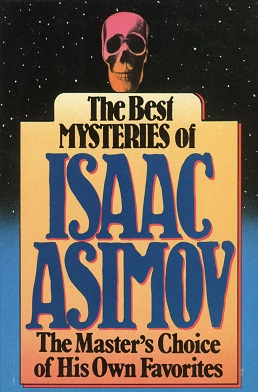Related Research Articles

Isaac Asimov was an American writer and professor of biochemistry at Boston University. During his lifetime, Asimov was considered one of the "Big Three" science fiction writers, along with Robert A. Heinlein and Arthur C. Clarke. A prolific writer, he wrote or edited more than 500 books. He also wrote an estimated 90,000 letters and postcards. Best known for his hard science fiction, Asimov also wrote mysteries and fantasy, as well as popular science and other non-fiction.
This is a bibliography of the books written or edited by Isaac Asimov, arranged alphabetically. Asimov was a prolific author, and he engaged in many collaborations with other authors. This list may not yet be complete. The total number of books listed here is over 500. Asimov died in 1992 at age 72; a small number of his books were published posthumously.
The Black Widowers is a fictional men-only dining club created by Isaac Asimov for a series of sixty-six mystery stories that he started writing in 1971. Most of the stories were first published in Ellery Queen's Mystery Magazine, though a few first appeared in Fantasy & Science Fiction, Isaac Asimov's Science Fiction Magazine, and the various book collections into which the stories were eventually gathered.
"Black Widower" is the twenty-first episode of the third season of the American animated television series The Simpsons. It originally aired on the Fox network in the United States on April 9, 1992. The episode was written by Jon Vitti and directed by David Silverman. Kelsey Grammer guest starred as Sideshow Bob for the second time. In the episode, Sideshow Bob — Bart's new archenemy — returns, apparently in a romantic relationship with Bart's aunt Selma, but when Bart later realizes that Bob is planning to kill Selma, he prevents the attempted murder and Bob is sent back to prison. "Black Widower" finished 39th in Nielsen ratings for the week that it originally aired. Reviewers generally enjoyed the episode, and gave Grammer's portrayal of Sideshow Bob particular praise.
The Trap Door Spiders are a literary male-only eating, drinking, and arguing society in New York City, with a membership historically composed of notable science fiction personalities. The name is a reference to the reclusive habits of the trapdoor spider, which when it enters its burrow pulls the hatch shut behind it.
"The Capital of the World" is a short story by American writer Ernest Hemingway. The story takes place in Madrid and follows Paco, a young waiter apprentice, and his desire to become a matador.
Donald Roynald Bensen, known also as Don Bensen and listed sometimes as D.R. Bensen, was an American editor and science fiction writer. As an editor he is known best for editing works of P. G. Wodehouse and his involvement with their re-issue as paperbacks in the United States. As an author, he is known best for his 1978 humorous alternate history novel, And Having Writ..., published first by Bobbs-Merrill company.

Tales of the Black Widowers is a collection of mystery short stories by American author Isaac Asimov, featuring his fictional club of mystery solvers, the Black Widowers. It was first published in hardcover by Doubleday in June 1974, and in paperback by the Fawcett Crest imprint of Ballantine Books in August 1976. The first British edition was issued by Panther in 1976. The book has also been translated into German and French.

The Travel Tales of Mr. Joseph Jorkens is a collection of fantasy short stories by writer Lord Dunsany. It was first published in London by G. P. Putnam's Sons in April, 1931, with the American edition following in September of the same year from the same publisher. It was the first collection of Dunsany's Jorkens tales to be published. It has also been issued in combination with the second book, Jorkens Remembers Africa, in the omnibus edition The Collected Jorkens, Volume One, published by Night Shade Books in 2004.
Banquets of the Black Widowers is a collection of mystery short stories by American writer Isaac Asimov featuring his fictional club of mystery solvers, the Black Widowers. It was first published in hardcover by Doubleday in September 1984, and in paperback by the Fawcett Crest imprint of Ballantine Books in June 1986. The first British edition was issued by Grafton in August 1986.

Casebook of the Black Widowers is a collection of mystery short stories by American author Isaac Asimov, featuring his fictional club of mystery solvers, the Black Widowers. It was first published in hardcover by Doubleday in January 1980 and in paperback by the Fawcett Crest imprint of Ballantine Books in March 1981.

More Tales of the Black Widowers is a collection of mystery short stories by American author Isaac Asimov, featuring his fictional club of mystery solvers, the Black Widowers. It was first published in hardcover by Doubleday in October 1976, and in paperback by the Fawcett Crest imprint of Ballantine Books in November 1977. The first British edition was issued by Gollancz in April 1977.

The Return of the Black Widowers is a collection of short mystery stories by American writer Isaac Asimov, featuring his fictional club of mystery solvers, the Black Widowers. It was first published in hardcover by Carroll & Graf in December 2003, and in trade paperback by the same publisher in November 2005.

The Best Mysteries of Isaac Asimov is a collection of mystery short stories by American author Isaac Asimov. It was first published in hardcover by Doubleday in 1986, and in paperback by the Fawcett Crest imprint of Ballantine Books in September 1987.
"Ph as in Phony" is a mystery short story by American writer Isaac Asimov. It was first published in the July 1972 issue of Ellery Queen's Mystery Magazine under the title The Phony Ph.D. The reason for this title change was that the magazine ran a series by Lawrence Treat with similar "_ is for _" titles. When it was republished in Tales of the Black Widowers in 1974, the original title was restored. It is the second published story about the Black Widowers, a gentlemen's club that solves mysteries based loosely upon the Trap Door Spiders, a stag-club of which Asimov was a member. It was reprinted in the collection The Return of the Black Widowers in 2003.
"Sixty Million Trillion Combinations" is a short mystery story by American writer Isaac Asimov. It was first published in the May 5, 1980, issue of Ellery Queen's Mystery Magazine under the title "64 Million Trillion Combinations," and reprinted in Banquets of the Black Widowers (1984) and The Return of the Black Widowers (2003). Asimov originally entitled it "Fourteen Letters", but a variant of the magazine's title was used in subsequent publications of the story. The story is one of a collection of short mysteries whose characters are based loosely upon the Trap Door Spiders, a stag-club of which Asimov was a member.
"The Ultimate Crime" is a short story by Isaac Asimov, dealing with a minor aspect of one of the Sherlock Holmes stories of Sir Arthur Conan Doyle. It is the 24th of Asimov's Black Widowers mystery stories, and it appeared in his anthology More Tales of the Black Widowers, which collects the second dozen stories of the series. It was written specially for that book. It subsequently appeared again in Sherlock Holmes Through Time and Space, an anthology of stories written by different authors and co-edited by Asimov, and Another Round at the Spaceport Bar.
In a writing career spanning 53 years (1939–1992), science fiction and popular science author Isaac Asimov (1920–1992) wrote and published 40 novels, 383 short stories, over 280 non-fiction books, and edited about 147 others.
Truth to Tell is a 1972 short story by Isaac Asimov. It is one of Asimov's series of stories about the Black Widowers, a gentlemen's dining club that meets monthly to solve mysteries and puzzles. It was first published in the October 1972 issue of Ellery Queen's Mystery Magazine under the title "The Man Who Never Told A Lie", and was included in the 1974 collection Tales of the Black Widowers.
Depending on the counting convention used, and including all titles, charts, and edited collections, there may be currently over 500 books in Isaac Asimov's bibliography—as well as his individual short stories, individual essays, and criticism. For his 100th, 200th, and 300th books, Asimov published Opus 100 (1969), Opus 200 (1979), and Opus 300 (1984), celebrating his writing.